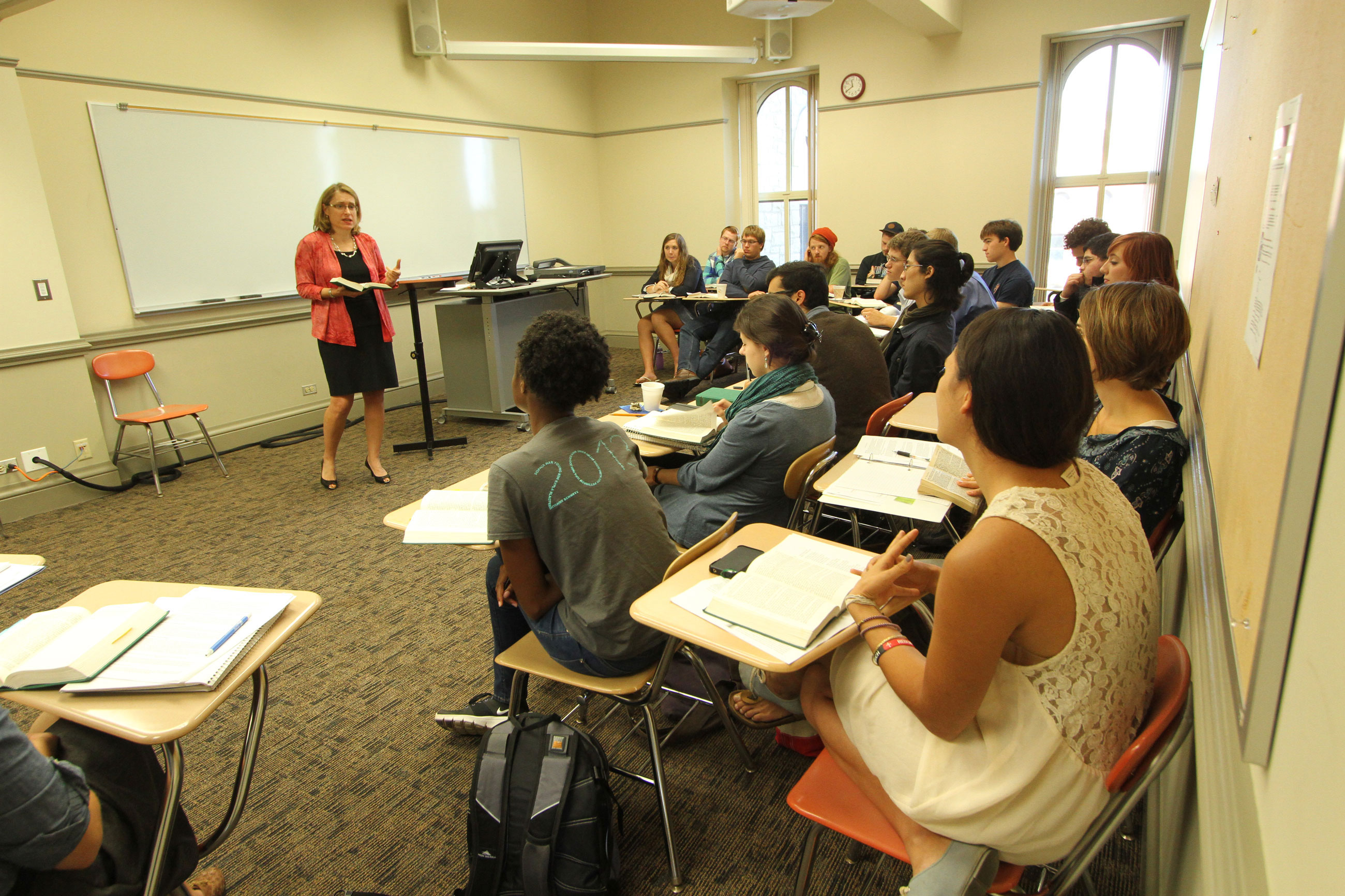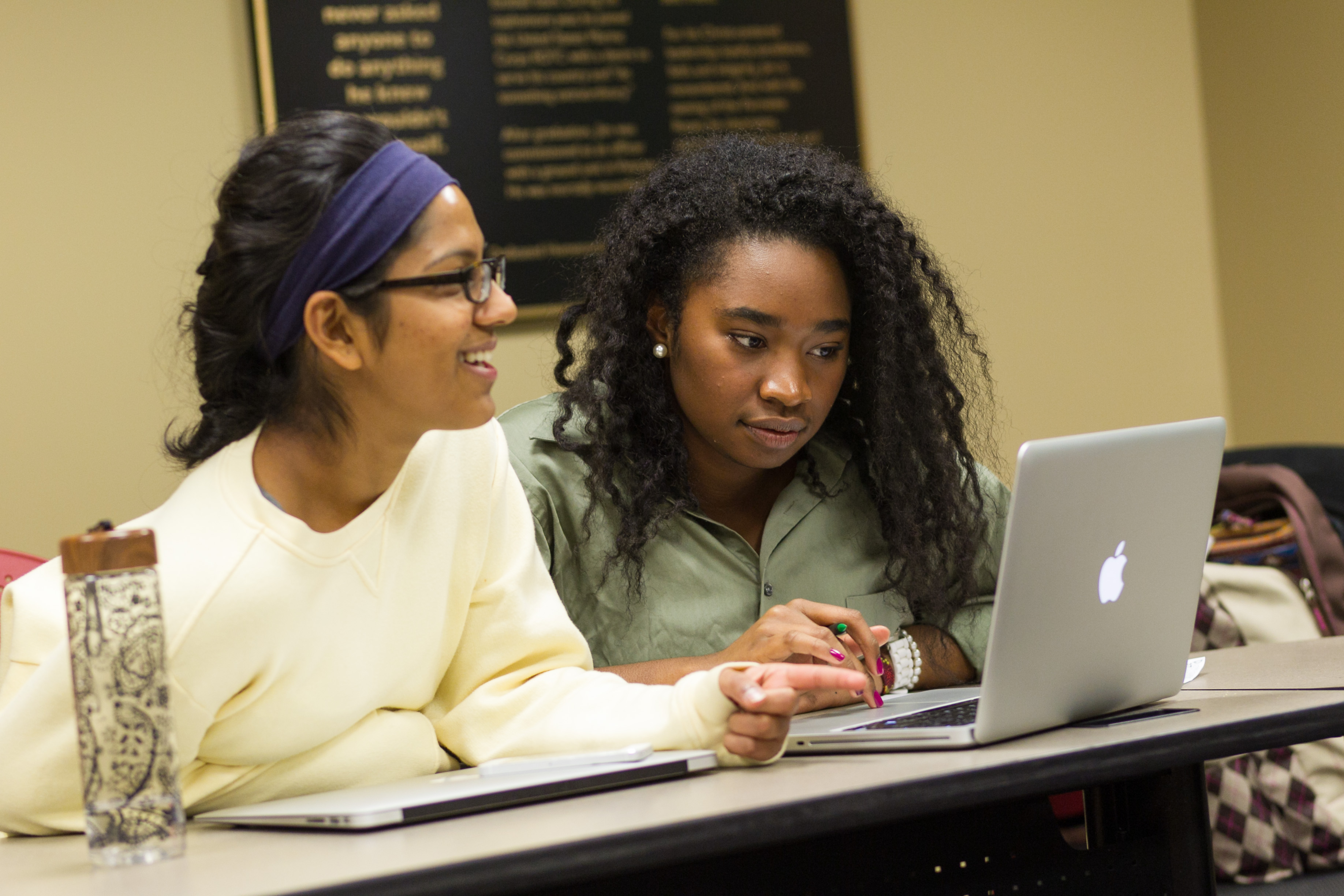The Purpose of General Education at Wheaton College

Wheaton's general education program, Christ at the Core, prepares students for a lifetime of apprehending truth through the exploration, reflection, connection, and implementation of knowledge.
Wheaton College encourages students to live responsible and faithful lives for Christ and His Kingdom, and the core curriculum plays an important role in that process. It challenges students to explore God’s world through a variety of disciplines and reflect on the different ways that God’s truth may be apprehended. Students are asked to map connections among these disciplines in order to gain an understanding of the complexities of this world, and they are challenged to respond to these complexities ethically, revealing their commitment to God and His Word.
Christ at the Core general education courses at Wheaton seek to develop the whole person, encouraging students to become faithful followers of Christ in all aspects of their lives. As a liberal arts college, Wheaton affirms that this holistic learning most effectively occurs in the context of a Christian learning community that guides students through activities both in the classroom and beyond. These activities are designed to shape students and help them to anticipate ways that they should interact with the world after graduation. Much of life’s learning does not occur through formal education but through the influence of significant persons and social context. Consequently, the learning community at Wheaton endeavors to embody what it teaches so that when students graduate they take more than just knowledge and skills with them.
General education is an essential component of this community. It provides students with a framework of core knowledge and skills across the disciplines that not only helps them to place their chosen areas of study within a wider context but also prepares them to be good citizens in the Kingdom of God.
 |
 |
Exploring
Because the breadth and depth of knowledge is so vast, general education introduces students to a variety of perspectives while at the same time providing a framework of core ideas and knowledge. Christ at the Core is an outcomes-based curriculum, which fosters a common intellectual life and allows for student choice and flexibility. Crafted to give students a more panoramic vision than they yet possess, the core curriculum guides students to subjects and pursuits they may not otherwise choose to investigate for themselves. These encounters have the potential to awaken fresh interests and endeavors as students experience the thrill of discovering hidden dimensions of themselves and their potential as well as of God’s work in the world. General education also enables students to gain a more holistic understanding of the entire circle of life and learning and to develop respect for various disciplinary ways of thinking. It will therefore make them better members of communities throughout their lives by granting them insights into these thought patterns and practices. Consequently, Christ at the Core general education prepares students to be citizens in the Kingdom of God by allowing them time to explore its various aspects without the need to focus solely on mastering a particular discipline or developing a marketable skill.
To help prepare students for this task, Wheaton’s program includes several critical components. First, because the Bible is at the core of our beliefs, students must develop substantive knowledge of the content of the Scriptures and of Scriptural truth. They must also deepen their understanding of how the Bible and Christian thought should affect their views of the world and the ways they interact with it. Second, because God’s truth is found throughout creation, students will explore fundamental ideas of theological, cultural, intellectual, and scientific traditions in Western culture as well as concepts and issues outside of that culture. Third, because humans are made in the image of God, students will not only be exposed to racial, cultural, social, and religious diversity but also respond to it appropriately as they strive to respect others. Students will accomplish these goals by gaining the skills to identify and engage the issues that affect our world. They will develop their abilities to discover and evaluate the information they need to draw conclusions. They will practice reasoning analytically and quantitatively as they interact with this information, and they will deepen their ability to present their thoughts clearly and effectively in oral and written expression. In addition, they will develop skills in aesthetic engagement and value expressions of human creativity in all disciplines.
Reflecting
Beyond encountering the content and skills of various disciplines, students are also challenged to reflect on the implications that these ideas may have beyond their general education courses. Students are encouraged to wrestle with fundamental questions and to consider how their answers to these questions may affect their lives. This engagement with the central concerns of humanity prepares them for deep reflection within their own majors, and it helps them to engage the complex questions of life and morality they will encounter after college.
Reflection first involves contemplating God and the manifold aspects of His creation. Students are encouraged to worship and glorify Him as they practice loving God with the mind as well as heart, soul, and strength. They are also asked to enact their love for God by exercising critical self-awareness of their own values, beliefs, actions, and emotions. This awareness will help students analyze issues from different perspectives as they strive to respond in a manner that glorifies God. As students nurture this life of reflection, they will cultivate their critical engagement, their independent thought and action, their imagination, and their creativity.
Connecting
This quest for a life of reflection is pursued in the firm conviction that all truth, however seemingly disparate, ultimately coheres because it is unified in Christ, who is the Truth, the Creator of all things, the Redeemer, and the Sustainer in whom all things hold together. The General Education Program provides a strong framework for apprehending this truth in all its various forms by encouraging students to map the rich connections among the disciplines. This relational approach to knowing enables students to see the connections among faith, life and learning as well as among concepts, actions and consequences. In addition, it challenges students to consider seriously the dissonance between different theories and areas of learning and to engage them with integrity, discernment, and humility. The goal of general education is not just to provide students with knowledge from various fields but also to help them connect the ideas in a meaningful way, providing a core of knowledge across disciplines.
Implementing
Engaging knowledge as a Christian requires more than just the mind. Christ at the Core challenges students’ praxis by encouraging obedience to God and His Word. Students are asked to use Biblical perspectives in responding to intellectual, emotional, spiritual, physical, cultural, vocational, and moral challenges. They are encouraged to nurture virtuous habits as they cultivate a love of God and their neighbor.
Wheaton College hopes that as divine image bearers, students will be life-long learners, cultivating their own talents and opportunities in order to glorify God and serve humanity. Students are, therefore, encouraged to appreciate and value God’s creation and be responsible stewards of it. They are challenged to respect racial, cultural, social, and religious diversity and respond thoughtfully to it. They are also exhorted to honor the truth that God created us as whole beings by pursuing balance in the physical, mental, and spiritual aspects of their lives. Wheaton College encourages students to further God’s will and purposes on earth by living effectively in the church and society worldwide with lives of joy and service to the glory of God.
